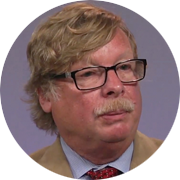The Transition
That Never HappenedAt Least Not The Way That Was Recommended
Interviews
Ronald Utt

In 1990, Ronald Utt was a vice president of the National Chamber Foundation and worked closely with Richard Rahn to plan, finance and execute the Bulgarian transition project.
Q: How did you and Richard Rahn decide on which issues to deal with?
A: I think there were three ways we did this. One was simply based on our experience in Eastern Europe already. Richard was in Hungary, both Richard and I worked with the Heritage Foundation in Estonia, where we met some counterparts. So it was a mini version of what we ultimately did in Bulgaria. So we had a good idea already of what major deficiencies were and what areas needed to work in order to enhance the transition from a socialist economy to a private economy. This was one way. The second way, was before we did anything, Richard and I, and Mark, went over for a series of visits taking almost a week to meet different people in ministries, meeting people of both sides of the political spectrum , in government, out of government and got their sense of what they felt the deficiencies were, where their strengths were. And then the third point was after we digested all this and came up with lot of ideas, we then had a mission coming from Bulgaria led by Ivan Angelov and four economists with him. We met for about three or four days in a hotel conference room, where we hashed out what was doable and what was not. A lot of these had to do with priorities, there were an enormous amount of things Bulgaria needed but there was only so much we could do at the time. So the idea was to come up with a dozen or so top issues that were the most important for making this transition.
Q: How did you and Richard select the scholars and other participants to work on the project?
A: Well, once we had the list of issues we used a lot of our contacts in the U.S. that we knew and in areas where we were sure who the leading scholars were. We talked to other people to understand who is good at computers, who is good in agriculture, who is good in property rights. We ended up with a list of people that we thought could do the job. Then we identified people that we could convince to drop what they were doing, work for no compensation, take a visit to Bulgaria, perform the work and then come back and write a chapter. And all understood the deadlines. We found people that were willing to do that; who were enthusiastic about that. It was fun working with them.
Q: You were heavily involved with the early privatization efforts in Bulgaria- even after the Report was completed. What were the biggest challenges in privatizing Bulgaria?
A: The challenges in Bulgaria were pretty much the challenges we had in almost every part of the World, including in the U.S. when it comes to taking something out of the government and into the private sector. Government gets comfortable with where it is; it is a monopoly; it has no competition, people don’t have to work very hard. So moving that to the private sector induces fear and concern among the work force, among the managers, among the consumers – the prices will go up, I will lose my job, I will be replaced, Western corporations will take us over, force us into different standards and things like that. There is lot of fear from the unknown there and a warm embrace of the status quo, which I think is typical for the human condition; not unique to Bulgaria. What was unique for Bulgaria and probably common in most of the similar countries like Poland, Romania, Hungary, is that a lot of companies were simply so obsolete in terms of the production process, the facilities, the technology, the skills of management, the skills of the workers, that the products they produced were simply uncompetitive. They couldn’t sell anything, so the question was, how do we, in an orderly fashion, transition all of these resources to more productive parts of the economy.
It was a complicated matter to go through and identify things that could in fact be marketable to the West. Things that change rapidly, technology that changes rapidly……
Q: How would you rate the role of the Bulgarian participants in the project?
A: I think very well; we had good relationships with them. I made a total of seventeen visits in Bulgaria after that and working closely with the Ministry of Industry and helping them come up with a process for privatization, identifying factors- how do we do this with various things, do we offer shares, do we do it with the employees, do we seek an outside investor. Or just sort of come up with ways in which we can make the judgment - the best mechanism to change the particular company and move it to the market place.
Q: What were the conditions when you initially went to the country?
A: Pretty bad. In my visits I used to bring food. I made quite a few friends, especially in the journalist community. It was obvious even people that were fully employed with professional jobs were having a hard time putting food on the table. So if I had some spare room in my suitcase, I would bring over canned ham, diner dishes and they just loved them. So it was pretty bad during that period, but I think it quickly recovered.
Q: And how would you rate it today?
A: I think it made a great deal of progress. There is a long way to go. It is a difficult transition coming from where they were to where they want to be, but I think it is moving as smoothly as possible.